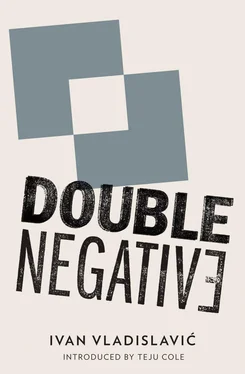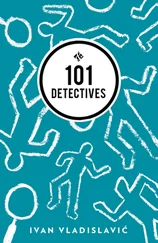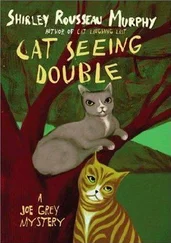Ivan Vladislavic - Double Negative
Здесь есть возможность читать онлайн «Ivan Vladislavic - Double Negative» весь текст электронной книги совершенно бесплатно (целиком полную версию без сокращений). В некоторых случаях можно слушать аудио, скачать через торрент в формате fb2 и присутствует краткое содержание. Год выпуска: 2013, Издательство: And Other Stories, Жанр: Современная проза, на английском языке. Описание произведения, (предисловие) а так же отзывы посетителей доступны на портале библиотеки ЛибКат.
- Название:Double Negative
- Автор:
- Издательство:And Other Stories
- Жанр:
- Год:2013
- ISBN:нет данных
- Рейтинг книги:5 / 5. Голосов: 1
-
Избранное:Добавить в избранное
- Отзывы:
-
Ваша оценка:
- 100
- 1
- 2
- 3
- 4
- 5
Double Negative: краткое содержание, описание и аннотация
Предлагаем к чтению аннотацию, описание, краткое содержание или предисловие (зависит от того, что написал сам автор книги «Double Negative»). Если вы не нашли необходимую информацию о книге — напишите в комментариях, мы постараемся отыскать её.
is a subtle triptych that captures the ordinary life of Neville Lister during South Africa's extraordinary revolution. Ivan Vladislavic lays moments side by side like photographs on a table. He lucidly portrays a city and its many lives through reflections on memory, art, and what we should really be seeking.
Ivan Vladislavic
Double Negative — читать онлайн бесплатно полную книгу (весь текст) целиком
Ниже представлен текст книги, разбитый по страницам. Система сохранения места последней прочитанной страницы, позволяет с удобством читать онлайн бесплатно книгу «Double Negative», без необходимости каждый раз заново искать на чём Вы остановились. Поставьте закладку, и сможете в любой момент перейти на страницу, на которой закончили чтение.
Интервал:
Закладка:
‘He couldn’t work as a doctor. They said his medical degree was invalid. There was an exam he could take and he was willing to study for it, he said, his English was improving every day, but the problem was that he couldn’t speak Afrikaans. He got a job in the post office sorting letters. Can you imagine? A doctor, a man who should be giving injections and saving lives, standing all day throwing letters into pigeonholes. Sheltered employment for poor whites, for people with deaf ears and crooked feet. Yes, he used to say to me, it suits me, this job: I am a poor white.’
This must have been in the mid-70s, I thought, when I was still a schoolboy. Where would the depot have been? Perhaps at the Jeppe Street Post Office. I tried to imagine the doctor there, poring over the addresses on letters and postcards as if they were secret codes, while I sat at my desk with the plans for a Flying Fortress spread out under the reading light and the picture of the finished model on the lid of the box standing on end like a screen. No matter how carefully I dabbed glue on the tiny parts, they ended up stuck to my fingers.
‘Can you hear it?’
‘What’s that?’
‘I thought you were listening to the voices. It gets so loud sometimes I can’t hear myself think.’ We listened. ‘At first, it was just one or two, but lately it sounds like a crowd. Talk talk talk.’
The silence had a texture to it now, an undercurrent like a tap running in another room of the house.
‘The doctor seems like a clever man,’ I said. ‘Did this job really suit him?’
‘It was very hard for him. He didn’t know the names of the big towns, never mind little villages or farms or railway junctions. Even the suburbs were new to him: how was he to know whether Troyeville was in Johannesburg or Pretoria or Blikkiesdorp? He had to learn everything from the beginning. It’s a wonder he managed.
‘Every sorter had a pigeonhole for letters that were not properly addressed or illegible. A few times a day, the Chief Sorter would go around the depot and collect all these letters, and then he would try to decipher them. In the beginning, Dr Pinheiro’s pigeonhole for unsorted mail was fuller than everyone else’s, and he worried that the Chief Sorter would notice and give him the sack. So he started to bring these letters home with him. He would have lost his job anyway if he’d been caught, but it was worth the risk. Together we went through the letters and I helped him decipher the addresses. It was like solving a crime. That’s how we fell in love.’
Make-believe is easier to catch than truth-telling. I was beginning to hear things, a radio playing in a distant room or a dance party in the next block, a burst of laughter going up like a balloon slipping from a child’s hand, and then an angry voice trying to talk over the others, insisting on something, making demands. And rushing beneath it all, so quietly it was almost imperceptible, an undercurrent of my own thoughts like a subterranean river under the house.
In the dark room, many mouths were working away at English, crunching it between their teeth and pushing it around with their tongues, grinding the edges off the parts of speech and breathing out the dust. Even the oldest words, the hardest and heaviest ones, could not hold their shape; sharp tongues peeled the patina off them like pencil shavings and revealed a green new meaning.
A single voice became audible. It was my old history teacher Prof Sherman, Hegemony Cricket himself, the most remarkable lecturer of his day, renowned for his clipped accounts of the migrant labour system and the rise of the African working class on the Rand. He had published five books with ‘under apartheid’ in their titles. I tried to follow his argument now, but all I heard was an insistent chiming. He was naming names. They fell from his lips, glittering and precise as newly minted coins, and sank away in the wishing well of talk.
‘Where is your camera?’
‘I beg your pardon?’
‘When you came here, you said you wanted to take my picture.’
‘I said I wanted to take a picture of the house.’
‘Call me a liar. Even a bad photographer must have a camera.’
‘It’s in the car. I could fetch it, but I don’t really like using it. It keeps a roof over my head, that’s all. I suppose it’s like Dr Pinheiro sorting letters.’
‘You should find something else then. That’s what the Doctor did. He moved on to bigger things.’
‘Did he go back to medicine?’
‘No, that was impossible. He worked for contractors, for builders and demolishers. He did the books. But he never forgot his years at the post office. It became a point of pride with him and also a bit of a laugh. He turned it into a sweet-and-sour joke at his own expense.
‘One day, he came in with a letterbox shaped like a golf ball on a tee. I thought it was for my gate, but he set it up in the backyard. He’d salvaged it from some derelict semi they were tearing down in Bertrams, but he used to tell people it once belonged to Gary Player.
‘When I asked him what it was for, he said it was the start of our museum. Somebody has to keep an eye on posterity. Before you know it, things have outlived their purpose. To the people of the future, letterboxes will be as interesting as penny-farthings are to us. He brought others over the years, gimmicky boxes shaped like shoes and dice, and many more that had nothing special about them, those common little rondavels and cabins with pitched roofs and a tube for the newspaper.
‘It got funnier as he went along, but it was also serious. When we made a braai in the yard with our friends, he would tell stories about these things, where they were made and why they were special. He said the dice was a gift from Sol Kerzner. You never knew what he was making up and what was true. As I say, it’s a pity you’re not a historian. You could have separated the truth from the lies and written it down.’
‘Well, I’d be happy to speak to him, if you like.’
‘Not today,’ she said with a weary smile.
‘Is he ill?’
‘He’s gone.’
‘To hospital?’ And when she did not answer: ‘To Portugal?’
‘To paradise, I hope.’
‘He’s dead? When did he die?’
‘A long time ago.’
‘But I thought he was in this room!’
‘I didn’t want you to think I was alone,’ she said, laying a scrawny hand on my arm. ‘I’m very sorry.’
Some people believe in premonitions. In the popular wisdom, if you mistake a stranger for someone you know, you are bound to bump into that person soon. Mistaken identity is a kind of warning. I am not a believer. For a time after I came back to Johannesburg, I kept catching sight of people I thought were friends and acquaintances from my past, only to find I was mistaken. But I never bumped into the real person afterwards. It puzzled me that so many of the old crowd were gone. Some of them must have emigrated, others must be living in suburbs I never visited — the paths through the forest of the city do not all cross — and by the law of averages, a few might well be dead.
Then one day, without forewarning, I bumped into Benjy. We arranged to meet, and later that week we had a drink together at the Sunnyside. It was pleasant enough. We spoke about our student days in Yeoville and he told me about his newspaper work. I gave him the brief version of my life abroad and we parted with a promise to get together again soon.
It was the time of the Rugby World Cup, which Benjy was following keenly. When he called to see whether I wanted to join him and his mates for the final, I felt obliged to go, although most of the tournament had passed me by. We watched the game on television in a marquee put up specially on the playing fields at the College of Education, a place I hadn’t set foot in since Linda and I went there to build floats for the rag procession. It was a peculiar day. I drank too much beer and did my best to get involved, but my dislike for the game had only deepened since I’d last seen a Springbok team in action. Even when the Boks won, I was not as overjoyed as I might have been. The sight of Benjy and his mates, beers raised in clenched fists, tears streaming down their cheeks, while Nelson Mandela in his rugby jersey hoisted the trophy, will live with me for ever. A flanker. Who could have imagined such a thing?
Читать дальшеИнтервал:
Закладка:
Похожие книги на «Double Negative»
Представляем Вашему вниманию похожие книги на «Double Negative» списком для выбора. Мы отобрали схожую по названию и смыслу литературу в надежде предоставить читателям больше вариантов отыскать новые, интересные, ещё непрочитанные произведения.
Обсуждение, отзывы о книге «Double Negative» и просто собственные мнения читателей. Оставьте ваши комментарии, напишите, что Вы думаете о произведении, его смысле или главных героях. Укажите что конкретно понравилось, а что нет, и почему Вы так считаете.










